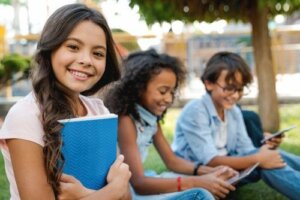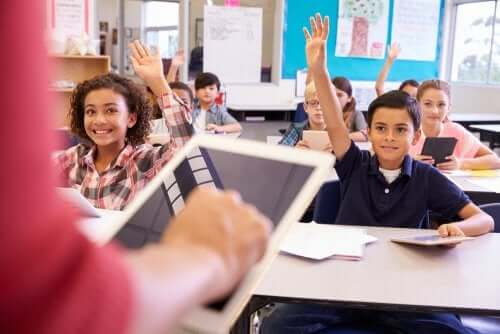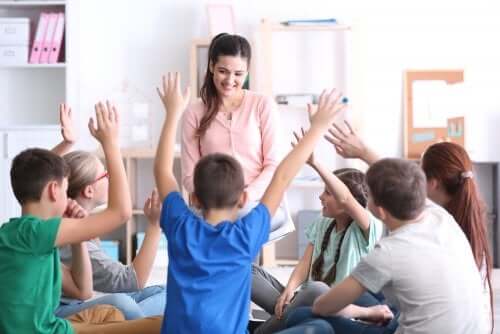What Should the 21st Century Schools Century Look Like?

The classic image: A teacher using the blackboard to give a lecture-type class in front of a group of children sitting at their desks who have to follow along with the lesson. Should this scenario, so typical of traditional education, carry on into 21st century schools?
Of course not. Because society is advancing by leaps and bounds and we must adapt to the changes taking place in it. For this reason, the education system must change its view of the teaching-learning process.
“Education is the system that should develop our natural abilities and allow us to move forward in the world.”
– Sir Ken Robinson –
What should 21st century schools look like?
It’s essential for schools to educate children according to the cultural and social context in which they live. So, it seems that the educational system, in many aspects, has become obsolete. In fact, we could say that its structure and the contents it teaches fails to adapt to current needs.

Unfortunately, there’s a standard school model that originated in the 19th century and is still going strong today. Its main characteristics are:
- Focusing on the assimilation of knowledge in a memory-based, theoretical, and impractical way
- The role of the teacher as a mere transmitter of knowledge
- The passive role of students as receivers of information
- Evaluating learning through tests that assess the amount of knowledge that a student has acquired
- The competitiveness among students
But we’re in the 21st century and this has to change. Therefore, at present, schools should be places where:
- The evolutionary development of children and adolescents is taken into account
- Students build knowledge themselves
- Teachers assume the role of guide and provide support in the teaching-learning process
- Students participate and get actively involved in the teaching-learning process, being the main protagonists
- Evaluation isn’t focused on a grade, but on evaluating what the students have really learned
- Students cooperate and collaborate with each other
“We still have a model of a 19th century school, 20th century teachers and 21st century students.”
– Mariela Cordero –

A change in teachers’ thinking
In order to adopt a new paradigm in education and build 21st century schools, teachers need to be committed to change. More specifically, they must unlearn their routines and habits and replace them with new ones.
In other words, teachers must learn to organize, follow, and continuously evaluate student learning, applying innovative methodologies.
To do this, teachers must be properly trained and have a range of skills. According to Gerardo Echeita, professor of Evolutionary Psychology and Education at the Autonomous University of Madrid, teachers must:
- Be reflective and have a critical attitude
- Be curious and take initiative
- Know how to search for and collect relevant information
- Be strategic
- Be able to work collaboratively and cooperatively
- Maintain good guidelines for communication, dialogue and listening
- Know how to ask and to offer
- Show empathy
- Share and establish relationships of reciprocity and trust with colleagues and students
- Take risks and be open to change
- Know how to set goals for themselves and want to continue learning
Therefore, changing the mentality and thought of teachers is the first step in offering children a quality education, adapted to their times.
“The illiterates of the 21st century will not be those who cannot read or write, but those who cannot learn, unlearn and relearn.”
– Alvin Toffler –
The classic image: A teacher using the blackboard to give a lecture-type class in front of a group of children sitting at their desks who have to follow along with the lesson. Should this scenario, so typical of traditional education, carry on into 21st century schools?
Of course not. Because society is advancing by leaps and bounds and we must adapt to the changes taking place in it. For this reason, the education system must change its view of the teaching-learning process.
“Education is the system that should develop our natural abilities and allow us to move forward in the world.”
– Sir Ken Robinson –
What should 21st century schools look like?
It’s essential for schools to educate children according to the cultural and social context in which they live. So, it seems that the educational system, in many aspects, has become obsolete. In fact, we could say that its structure and the contents it teaches fails to adapt to current needs.

Unfortunately, there’s a standard school model that originated in the 19th century and is still going strong today. Its main characteristics are:
- Focusing on the assimilation of knowledge in a memory-based, theoretical, and impractical way
- The role of the teacher as a mere transmitter of knowledge
- The passive role of students as receivers of information
- Evaluating learning through tests that assess the amount of knowledge that a student has acquired
- The competitiveness among students
But we’re in the 21st century and this has to change. Therefore, at present, schools should be places where:
- The evolutionary development of children and adolescents is taken into account
- Students build knowledge themselves
- Teachers assume the role of guide and provide support in the teaching-learning process
- Students participate and get actively involved in the teaching-learning process, being the main protagonists
- Evaluation isn’t focused on a grade, but on evaluating what the students have really learned
- Students cooperate and collaborate with each other
“We still have a model of a 19th century school, 20th century teachers and 21st century students.”
– Mariela Cordero –

A change in teachers’ thinking
In order to adopt a new paradigm in education and build 21st century schools, teachers need to be committed to change. More specifically, they must unlearn their routines and habits and replace them with new ones.
In other words, teachers must learn to organize, follow, and continuously evaluate student learning, applying innovative methodologies.
To do this, teachers must be properly trained and have a range of skills. According to Gerardo Echeita, professor of Evolutionary Psychology and Education at the Autonomous University of Madrid, teachers must:
- Be reflective and have a critical attitude
- Be curious and take initiative
- Know how to search for and collect relevant information
- Be strategic
- Be able to work collaboratively and cooperatively
- Maintain good guidelines for communication, dialogue and listening
- Know how to ask and to offer
- Show empathy
- Share and establish relationships of reciprocity and trust with colleagues and students
- Take risks and be open to change
- Know how to set goals for themselves and want to continue learning
Therefore, changing the mentality and thought of teachers is the first step in offering children a quality education, adapted to their times.
“The illiterates of the 21st century will not be those who cannot read or write, but those who cannot learn, unlearn and relearn.”
– Alvin Toffler –
All cited sources were thoroughly reviewed by our team to ensure their quality, reliability, currency, and validity. The bibliography of this article was considered reliable and of academic or scientific accuracy.
- Carlos-Guzmán, J. (2011). Una nueva visión de la enseñanza: la centrada en el aprendizaje (ECA). Revista Correo del maestro, 177, 1-13.
- Sandoval, M., Echeita, G., Simón, C. y López, M. (2012). Educación Inclusiva. Iguales en la diversidad. Madrid: Ministerio de Educación, Cultura y Deporte, INTEF.
- Villa, A. y Poblete, M. (2008). Competence-based learning. A Proposal for the Assessment of Generic Competences. Bilbao: Universidad de Deusto.
This text is provided for informational purposes only and does not replace consultation with a professional. If in doubt, consult your specialist.








